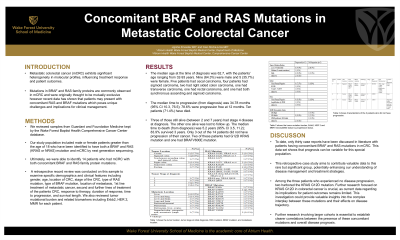Sunday Poster Session
Category: Colorectal Cancer Prevention
P0448 - Concomitant BRAF and RAS Mutations in Metastatic Colorectal Cancer
Sunday, October 27, 2024
3:30 PM - 7:00 PM ET
Location: Exhibit Hall E

Has Audio

Jigisha Srivastav, MD
Wake Forest Baptist Health
Winston-Salem, NC
Presenting Author(s)
Jigisha Srivastav, MD1, Caio Rocha Lima, MD2
1Wake Forest Baptist Health, Winston-Salem, NC; 2Atrium Health Wake Forest Baptist, Winston-Salem, MD
Introduction: Metastatic colorectal cancer (mCRC) exhibits significant heterogeneity in molecular profiles, influencing treatment response and patient outcomes. Mutations in rat sarcoma (RAS) family proteins (KRAS, NRAS) and v-raf murine sarcoma viral oncogene homolog B1 (BRAF) are commonly observed in mCRC and were originally thought to be mutually exclusive however recent data has shown that patients may present with concomitant RAS and BRAF mutations which poses unique challenges and implications for clinical management. Below, we present a retrospective review study that examines patients with concomitant BRAF and RAS mutations in mCRC and their clinicopathological features and treatment plans.
Methods: We reviewed samples from Guardant and Foundation Medicine kept by the Atrium Health Wake Forest Baptist Health Comprehensive Cancer Center database. A retrospective record review was conducted on this sample and data was collected regarding demographics, clinical features, molecular profile, and treatment plan of the select population.
Results: A total of 14 patients were included in the study. The median age at the time of diagnosis was 62.7, with the patients’ age ranging from 32-93 years old. Nine (64.3%) were male and 5 (35.7%) were female. Five patients had cecal carcinoma, four patients had sigmoid carcinoma, two had right sided colon carcinoma, one had transverse carcinoma, one had rectal carcinoma and one had both synchronous ascending and sigmoid carcinoma. The median time to progression (from diagnosis) was 34.78 months (95% CI 10.3, 76.5); 78.6% were progression free at 12 months. Ten patients (71.4%) have died. Three of those still alive (between 2 and 7 years) had stage 4 disease at diagnosis. The other one alive was lost to follow up. The median time to death (from diagnosis) was 5.2 years (95% CI 3.5, 11.2); 83.9% survived 3 years.
Discussion: To date, only thirty cases have been discussed in literature with patients having concomitant BRAF and RAS mutations in colorectal cancer. This retrospective review study helps to add more data to this rare but important population. The findings from this dataset indicate likely variability in prognosis in this population. Larger studies must be conducted to further understand the implications of BRAF and RAS concomitant mutations on treatment strategies and prognosis.
Note: The table for this abstract can be viewed in the ePoster Gallery section of the ACG 2024 ePoster Site or in The American Journal of Gastroenterology's abstract supplement issue, both of which will be available starting October 27, 2024.
Disclosures:
Jigisha Srivastav, MD1, Caio Rocha Lima, MD2. P0448 - Concomitant BRAF and RAS Mutations in Metastatic Colorectal Cancer, ACG 2024 Annual Scientific Meeting Abstracts. Philadelphia, PA: American College of Gastroenterology.
1Wake Forest Baptist Health, Winston-Salem, NC; 2Atrium Health Wake Forest Baptist, Winston-Salem, MD
Introduction: Metastatic colorectal cancer (mCRC) exhibits significant heterogeneity in molecular profiles, influencing treatment response and patient outcomes. Mutations in rat sarcoma (RAS) family proteins (KRAS, NRAS) and v-raf murine sarcoma viral oncogene homolog B1 (BRAF) are commonly observed in mCRC and were originally thought to be mutually exclusive however recent data has shown that patients may present with concomitant RAS and BRAF mutations which poses unique challenges and implications for clinical management. Below, we present a retrospective review study that examines patients with concomitant BRAF and RAS mutations in mCRC and their clinicopathological features and treatment plans.
Methods: We reviewed samples from Guardant and Foundation Medicine kept by the Atrium Health Wake Forest Baptist Health Comprehensive Cancer Center database. A retrospective record review was conducted on this sample and data was collected regarding demographics, clinical features, molecular profile, and treatment plan of the select population.
Results: A total of 14 patients were included in the study. The median age at the time of diagnosis was 62.7, with the patients’ age ranging from 32-93 years old. Nine (64.3%) were male and 5 (35.7%) were female. Five patients had cecal carcinoma, four patients had sigmoid carcinoma, two had right sided colon carcinoma, one had transverse carcinoma, one had rectal carcinoma and one had both synchronous ascending and sigmoid carcinoma. The median time to progression (from diagnosis) was 34.78 months (95% CI 10.3, 76.5); 78.6% were progression free at 12 months. Ten patients (71.4%) have died. Three of those still alive (between 2 and 7 years) had stage 4 disease at diagnosis. The other one alive was lost to follow up. The median time to death (from diagnosis) was 5.2 years (95% CI 3.5, 11.2); 83.9% survived 3 years.
Discussion: To date, only thirty cases have been discussed in literature with patients having concomitant BRAF and RAS mutations in colorectal cancer. This retrospective review study helps to add more data to this rare but important population. The findings from this dataset indicate likely variability in prognosis in this population. Larger studies must be conducted to further understand the implications of BRAF and RAS concomitant mutations on treatment strategies and prognosis.
Note: The table for this abstract can be viewed in the ePoster Gallery section of the ACG 2024 ePoster Site or in The American Journal of Gastroenterology's abstract supplement issue, both of which will be available starting October 27, 2024.
Disclosures:
Jigisha Srivastav indicated no relevant financial relationships.
Caio Rocha Lima indicated no relevant financial relationships.
Jigisha Srivastav, MD1, Caio Rocha Lima, MD2. P0448 - Concomitant BRAF and RAS Mutations in Metastatic Colorectal Cancer, ACG 2024 Annual Scientific Meeting Abstracts. Philadelphia, PA: American College of Gastroenterology.

